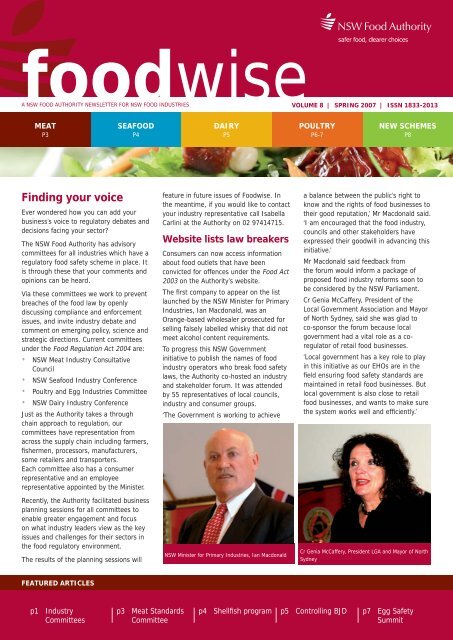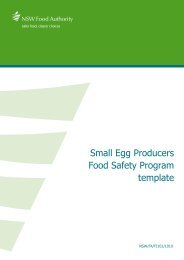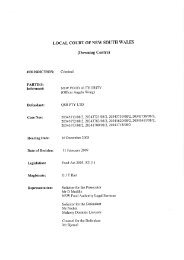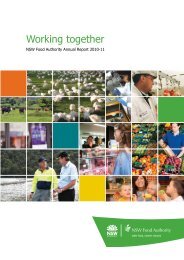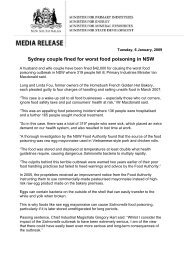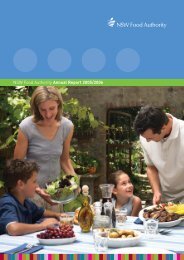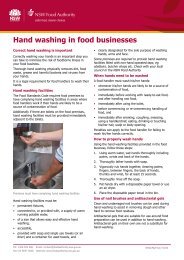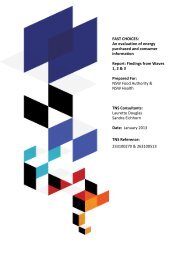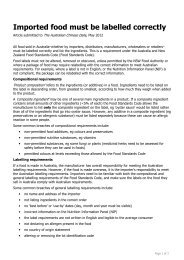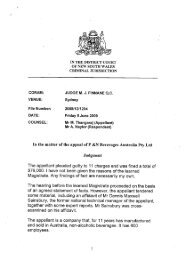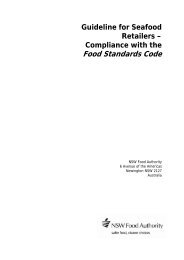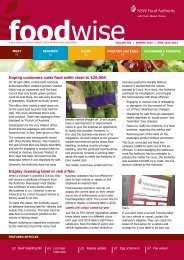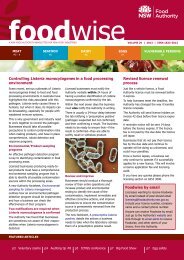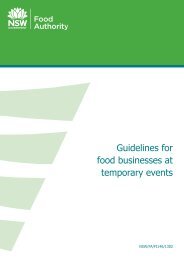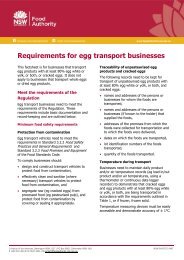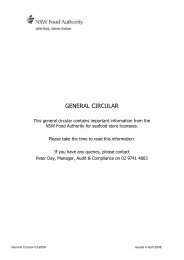Newsletter | Foodwise volume 8 Spring - NSW Food Authority
Newsletter | Foodwise volume 8 Spring - NSW Food Authority
Newsletter | Foodwise volume 8 Spring - NSW Food Authority
You also want an ePaper? Increase the reach of your titles
YUMPU automatically turns print PDFs into web optimized ePapers that Google loves.
foodwise<br />
A <strong>NSW</strong> FOOD AUTHORITY NEWSLETTER FOR <strong>NSW</strong> FOOD INDUSTRIES<br />
VOLUME 8 | SPRING 2007 | ISSN 1833-2013<br />
MEAT<br />
P3<br />
SEAFOOD<br />
P4<br />
DAIRY<br />
P5<br />
POULTRY<br />
P6-7<br />
NEW SCHEMES<br />
P8<br />
Finding your voice<br />
Ever wondered how you can add your<br />
business’s voice to regulatory debates and<br />
decisions facing your sector?<br />
The <strong>NSW</strong> <strong>Food</strong> <strong>Authority</strong> has advisory<br />
committees for all industries which have a<br />
regulatory food safety scheme in place. It<br />
is through these that your comments and<br />
opinions can be heard.<br />
Via these committees we work to prevent<br />
breaches of the food law by openly<br />
discussing compliance and enforcement<br />
issues, and invite industry debate and<br />
comment on emerging policy, science and<br />
strategic directions. Current committees<br />
under the <strong>Food</strong> Regulation Act 2004 are:<br />
• <strong>NSW</strong> Meat Industry Consultative<br />
Council<br />
• <strong>NSW</strong> Seafood Industry Conference<br />
• Poultry and Egg Industries Committee<br />
• <strong>NSW</strong> Dairy Industry Conference<br />
Just as the <strong>Authority</strong> takes a through<br />
chain approach to regulation, our<br />
committees have representation from<br />
across the supply chain including farmers,<br />
fishermen, processors, manufacturers,<br />
some retailers and transporters.<br />
Each committee also has a consumer<br />
representative and an employee<br />
representative appointed by the Minister.<br />
Recently, the <strong>Authority</strong> facilitated business<br />
planning sessions for all committees to<br />
enable greater engagement and focus<br />
on what industry leaders view as the key<br />
issues and challenges for their sectors in<br />
the food regulatory environment.<br />
The results of the planning sessions will<br />
feature in future issues of <strong><strong>Food</strong>wise</strong>. In<br />
the meantime, if you would like to contact<br />
your industry representative call Isabella<br />
Carlini at the <strong>Authority</strong> on 02 97414715.<br />
Website lists law breakers<br />
Consumers can now access information<br />
about food outlets that have been<br />
convicted for offences under the <strong>Food</strong> Act<br />
2003 on the <strong>Authority</strong>’s website.<br />
The first company to appear on the list<br />
launched by the <strong>NSW</strong> Minister for Primary<br />
Industries, Ian Macdonald, was an<br />
Orange-based wholesaler prosecuted for<br />
selling falsely labelled whisky that did not<br />
meet alcohol content requirements.<br />
To progress this <strong>NSW</strong> Government<br />
initiative to publish the names of food<br />
industry operators who break food safety<br />
laws, the <strong>Authority</strong> co-hosted an industry<br />
and stakeholder forum. It was attended<br />
by 55 representatives of local councils,<br />
industry and consumer groups.<br />
‘The Government is working to achieve<br />
<strong>NSW</strong> Minister for Primary Industries, Ian Macdonald<br />
a balance between the public’s right to<br />
know and the rights of food businesses to<br />
their good reputation,’ Mr Macdonald said.<br />
‘I am encouraged that the food industry,<br />
councils and other stakeholders have<br />
expressed their goodwill in advancing this<br />
initiative.’<br />
Mr Macdonald said feedback from<br />
the forum would inform a package of<br />
proposed food industry reforms soon to<br />
be considered by the <strong>NSW</strong> Parliament.<br />
Cr Genia McCaffery, President of the<br />
Local Government Association and Mayor<br />
of North Sydney, said she was glad to<br />
co-sponsor the forum because local<br />
government had a vital role as a coregulator<br />
of retail food businesses.<br />
‘Local government has a key role to play<br />
in this initiative as our EHOs are in the<br />
field ensuring food safety standards are<br />
maintained in retail food businesses. But<br />
local government is also close to retail<br />
food businesses, and wants to make sure<br />
the system works well and efficiently.’<br />
Cr Genia McCaffery, President LGA and Mayor of North<br />
Sydney<br />
FEATURED ARTICLES<br />
p1 Industry<br />
Committees<br />
p3 Meat Standards<br />
Committee<br />
p4 Shellfish program p5 Controlling BJD p7 Egg Safety<br />
Summit
<strong>NSW</strong> <strong>Food</strong> <strong>Authority</strong><br />
presentations<br />
In the three months to July 07 <strong>Authority</strong><br />
staff gave several presentations.<br />
In July, George Davey presented to the<br />
<strong>Food</strong> Safety Expert Board for the Beijing<br />
2008 Olympics.<br />
In June, David Miles presented on<br />
Listeria monocytogenes to the Meat<br />
Standards Committee. In August<br />
he outlined food regulations for the<br />
packaged ice industry at the Packaged<br />
Ice Association of Australia annual<br />
conference.<br />
Edward Jansson and Lisa Szabo presented<br />
Dioxins in Seafood — A case study in<br />
risk analysis, at the AIFST Convention<br />
in Melbourne. In May Edward presented<br />
on the <strong>Authority</strong>’s role in nutrition<br />
information to the Nutrition Society of<br />
Australia, Sydney group.<br />
Enforcement and prosecution statistics<br />
May 2007 - July 2007<br />
Type of enforcement/prosecution May 07 Jun 07 Jly 07<br />
Product seizures 2 1 a 2<br />
Improvement notices 154 125 85<br />
Written warnings 41 18 25<br />
Prohibition orders 5 1 b 2<br />
Show cause letters 0 0 0<br />
Penalty notices 35 c 2 33 d<br />
<strong>Food</strong> recalls/ disposals 4 7 2<br />
Licence cancellations/ suspensions 0 0 0<br />
Prosecutions 1 e 0 1<br />
Individual case examples:<br />
a.<br />
Wholesaler/manufacturer of sushi type foods did not comply with a prohibition order<br />
and all food on premises was seized and destroyed.<br />
In May, Peter Sutherland presented on<br />
the Australian approach to risk, and<br />
managing food safely for the Olympics,<br />
in Shanghai.<br />
Numerous presentations were made<br />
during the period regarding regulation<br />
for food service to vulnerable persons,<br />
and also to university students on various<br />
aspects of food safety and regulation.<br />
b.<br />
c.<br />
d.<br />
e.<br />
Wholesale bakery failed to comply with an improvement notice to clean premises.<br />
Seafood retailer was served three penalty notices for non compliance with <strong>Food</strong><br />
Standards Code relating to failure to state country of origin, falsely describing<br />
Vannamei prawns as King prawns, and failure to notify the <strong>Authority</strong> of a food<br />
business.<br />
Retail premises was served a penalty notice for selling unsuitable food.<br />
Liquor wholesaler fined for selling adulterated Scotch whisky. A fine of $30 000 was<br />
imposed and $80 000 in costs was also granted.<br />
Events calendar<br />
OCTOBER 07<br />
17-19 Australian Shellfish Quality<br />
Assurance Advisory Committee<br />
(ASQAAC) meeting<br />
19 Australia and New Zealand <strong>Food</strong><br />
Regulation Ministerial Council<br />
(ANZFRMC), Adelaide<br />
NOVEMBER 07<br />
12-17 <strong>Food</strong> Safety Week<br />
17-18 Allergy Convention, Sydney<br />
DECEMBER 07<br />
4 Meat Industry Consultative<br />
Council<br />
JANUARY 08<br />
21 Poultry and egg industries<br />
committee meeting<br />
Audits and inspections<br />
May 2007 - July 2007<br />
Industry type May 07 Jun 07 Jly 07<br />
Audits<br />
Meat 398 410 388<br />
Dairy 31 92 17<br />
Seafood 123 69 113<br />
Hospitals & aged care (requested audits) 1 1 2<br />
Plants 6 10 3<br />
Total audits 559 582 523<br />
Inspections<br />
Meat 104 547 220<br />
Dairy 7 2 9<br />
Seafood 17 80 96<br />
Plant products 0 5 0<br />
Total inspections 128 634 325<br />
2
Meat<br />
Meat Standards Committee wraps up<br />
On 20 June 2007 members of the Meat<br />
Standards Committee (MSC) held their<br />
final meeting in Sydney. The MSC was<br />
established in the early 1990s following<br />
the Garibaldi food poisoning incident,<br />
involving mettwurst, in South Australia.<br />
As a result of the work undertaken by this<br />
committee the meat industry throughout<br />
Australia now operates under approved<br />
HACCP programs and there is a set of<br />
Australian Standards which set out the<br />
minimum operational requirements for all<br />
sectors of the meat industry.<br />
These standards are outcome based<br />
and give industry and regulators greater<br />
flexibility in conducting operations provided<br />
that food safety outcomes are achieved.<br />
Each regulatory jurisdiction underpinned<br />
these standards by including them in<br />
their relevant legislation, so the same<br />
requirements apply for the meat industry<br />
throughout Australia.<br />
The committee comprised Commonwealth<br />
and State Government representatives<br />
from agencies responsible for regulating<br />
the meat industry throughout Australia.<br />
Industry representatives from abattoir<br />
processors (both red meat and poultry),<br />
smallgoods manufacturers, the rendering<br />
and game meat industry as well as <strong>Food</strong><br />
Standards Australia New Zealand (FSANZ)<br />
and Meat & Livestock Australia were also<br />
on the committee.<br />
When the Garibaldi incident highlighted<br />
deficiencies in the meat industry, the<br />
MSC was set up to review the regulatory<br />
framework for the industry in Australia<br />
and develop new standards to improve<br />
consistency of regulation throughout the<br />
jurisdictions and move towards outcomes<br />
based regulations which embraced the<br />
principles of HACCP.<br />
The MSC was responsible for developing<br />
numerous Australian Standards for the<br />
red meat, poultry meat, game, rendering,<br />
rabbit meat, ratite, crocodile, and transport<br />
sectors. These standards have been<br />
regularly reviewed and updated. Current<br />
standards remain in place through all<br />
jurisdictions until they are able to be<br />
replaced with new standards developed<br />
by FSANZ. The MSC provided an effective<br />
forum for industry and regulators to<br />
discuss issues and agreed outcomes to<br />
many areas of concern.<br />
The work of the MSC has now largely<br />
been taken over by a working group<br />
under FSANZ who are developing Primary<br />
Production and Processing Standards for<br />
the meat industry. Many participants of the<br />
MSC contribute ideas to this new working<br />
group.<br />
The meat industry has been well served<br />
by many people and organisations who<br />
have contributed to the MSC standards<br />
process. The MSC achieved the tasks it<br />
was given and the <strong>Authority</strong> looks forward<br />
to supporting the new process with<br />
the Primary Production and Processing<br />
Standards.<br />
Jurisdictional forum targets Listeria<br />
In late June 2007 the <strong>NSW</strong> <strong>Food</strong> <strong>Authority</strong><br />
hosted a jurisdictional forum attended by<br />
state and territory regulatory agencies.<br />
The forum gives field officers involved in<br />
the auditing and regulation of the meat<br />
industry an opportunity to discuss ways to<br />
facilitate standardisation and consistently<br />
implement regulatory requirements<br />
throughout Australia. These meetings are<br />
held every two years and are attended<br />
primarily by field officers.<br />
This year the focus was on the issue of<br />
Listeria in premises processing ready to<br />
eat meat products. This is a concern in all<br />
jurisdictions, and participants discussed<br />
ways to improve control of this pathogen<br />
in processing areas. Participants also<br />
visited a dairy factory to observe how<br />
other food industries control Listeria in<br />
the processing environment.<br />
Awards recognise MLA<br />
The 2007 Restaurant & Catering <strong>NSW</strong><br />
Awards for Excellence were held at the<br />
Australian Jockey Club (AJC) in Randwick<br />
on 27 August.<br />
Lachlan Bowtell from Meat & Livestock<br />
Australia (on left) with Robert Goldman,<br />
CEO Restaurant & Catering <strong>NSW</strong>/ACT<br />
More than 900 of the industry’s best<br />
chefs, restaurateurs, waiters and guests<br />
attended.<br />
Amongst the many awards presented<br />
for all types of restaurants and caterers,<br />
there were some special awards.<br />
Meat & Livestock Australia received the<br />
special Supplier of the Year award for<br />
service to the restaurant and catering<br />
industry.<br />
For information on the MLA guide on an<br />
alternative process for sanitising knives,<br />
see p8.<br />
3
Seafood<br />
Local Shellfish Program workshops improve effectiveness<br />
The <strong>NSW</strong> <strong>Food</strong> <strong>Authority</strong> held a series<br />
of industry workshops on classification<br />
and local shellfish program operation in<br />
June. As well as classification, participants<br />
learned about sampling requirements,<br />
phytoplankton and industry consultation<br />
arrangements, and participated in<br />
activities to improve understanding of the<br />
<strong>NSW</strong> Shellfish Program.<br />
The workshops were held at Ballina,<br />
Kempsey, Taree, Port Stephens,<br />
Sydney, Mollymook, Bateman’s Bay and<br />
Merimbula.<br />
‘The programs were very well received,’<br />
Anthony Zammit, Program Manager, <strong>NSW</strong><br />
Shellfish Program, reported. ‘Participants<br />
filled out response forms about the<br />
workshops, which asked about workshop<br />
usefulness, relevance of content, ease<br />
of understanding and so on. On a rating<br />
of 1 (poor) to 5 (excellent), the average<br />
score was 4.6, with no dimension scoring<br />
less than 4.3. Other local programs<br />
have requested the workshops for their<br />
members, so we are working on that.’<br />
The <strong>Authority</strong> continues to improve<br />
effectiveness of the program in order to<br />
reduce sampling costs, reduce closures<br />
and improve classification through<br />
improved data collection by industry.<br />
The Shellfish Program has transitioned<br />
from classification implementation to<br />
a process of classification review and<br />
maintenance. Annual reviews for 2007<br />
have been completed for 90% of harvest<br />
areas.<br />
Annual review reports provide the local<br />
estuary and the <strong>NSW</strong> <strong>Food</strong> <strong>Authority</strong> with<br />
a report card on their sampling efforts,<br />
response to pollution incidents and<br />
compliance with the management plan<br />
over the past year.<br />
Current management issues<br />
The multi-agency working group set up<br />
to address the pollution issues affecting<br />
the Bellinger River has made considerable<br />
progress, with water quality results<br />
showing a notable improvement.<br />
Remediation work is continuing and water<br />
quality monitoring has been increased<br />
in an effort to reopen the river to the<br />
harvest of oysters.<br />
The Honeymoon Bay harvest area in<br />
Wagonga Inlet was upgraded to direct<br />
harvest, effective from 21 August,<br />
providing significant operational benefits<br />
to the local industry.<br />
Another round of Mercury in Fish resources<br />
Following on from the Mercury in Fish campaign conducted in 2005, the <strong>Authority</strong><br />
recently distributed another 67 600 leaflets and over 500 leaflet holders (merchandisers)<br />
to fish shops in <strong>NSW</strong>. The initial distribution was 450 000 Mercury in Fish cards.<br />
The core message of the campaign was that fish is beneficial for pregnant women, but<br />
consumers need to know which fish to choose to get the benefits without the risk.<br />
In this latest round of the campaign the <strong>Authority</strong> promoted additional messages to<br />
pregnant women, including advice to ‘Get your folate, take care when preparing food,<br />
and eat fish wisely’.<br />
In addition to the previously distributed cards, fridge magnets (shown to right) were<br />
included in the Mums to be Bounty Bags (bags of samples and information given to<br />
pregnant women when they visit the antenatal clinic for the first time or register at the<br />
hospital). These encouraged women to visit the <strong>Authority</strong>’s website for advice. The May<br />
launch caused a spike in enquiries to the website.<br />
A follow up survey of 262 women in<br />
July found that 61% now felt there<br />
was sufficient information available<br />
on diet and food safety (up 23% from<br />
pre-campaign research). It found 71%<br />
of respondents were aware of Listeria<br />
infection as a food safety issue (up 20%<br />
from the pre-campaign research).<br />
Of the 28% of women who reported<br />
receiving the Mercury in Fish card, 21%<br />
received it from their GP, 17% received<br />
it from the hospital, and 19% obtained it<br />
from their fish shop.<br />
4
Dairy<br />
Controlling Bovine Johne’s Disease<br />
On 31 July 2007, Peter Commins, Aimee Urban, Mark Mackie and Anne McIntosh from<br />
the <strong>NSW</strong> <strong>Food</strong> <strong>Authority</strong> attended a training day on the control of Bovine Johne’s Disease<br />
(BJD) in dairy cattle. Held at Elizabeth Macarthur Agricultural Institute, Menangle, and<br />
run by Sally Spence from the Department of Primary Industries, the aim of the day was<br />
to provide regulators, industry representatives and veterinarians with information on the<br />
National Dairy BJD Assurance Score and changes to the <strong>NSW</strong> BJD Policy.<br />
BJD is a chronic incurable disease in adult cattle that results in diarrhoea, reduced milk<br />
production, weight loss and eventually death of the infected animal. It is caused by the<br />
bacterium Mycobacterium paratuberculosis and infection generally occurs during the first<br />
twelve months of a calf’s life by ingestion of contaminated faeces.<br />
To reduce the incidence of BJD in a dairy herd, there are three key management areas<br />
that need to be implemented.<br />
• Strategic herd testing and culling to identify and remove high risk individuals and<br />
groups<br />
• Rearing calves in uncontaminated areas to minimise new infections and following a<br />
calf rearing management program such as JDCAP (Johne’s Disease Calf Accreditation<br />
Program) or the 3 Step Calf Plan<br />
• Low risk herd introductions<br />
The National Dairy BJD Assurance Score uses these three management areas to give<br />
farmers a simple numerical tool that they can use when buying or selling stock, to give<br />
greater assurance about the BJD risk of the herd. The Assurance Score allocates points<br />
for each management area that is implemented. The higher the total score, the greater<br />
the assurances of purchasing cattle from a low risk herd. The Assurance Score can be<br />
applied to the herd as a whole or an individual cow or bull.<br />
Meeting challenge in the<br />
dairy industry<br />
The Dairy Industry Association of<br />
Australia (DIAA) and the Dairy Science<br />
World Series (DSWS) 2007 Technical<br />
Committee welcomed 103 delegates<br />
to their eighth DSWS international<br />
conference, Turning barriers into benefits:<br />
the science behind dairy regulation, held<br />
29-30 August in Melbourne.<br />
Local and international speakers<br />
addressed food integrity and risk, new<br />
processing technologies, raw milk and<br />
markets for future products.<br />
The <strong>Authority</strong>’s Peter Sutherland spoke<br />
on food safety objectives in the post<br />
production sector. This focused on the<br />
major challenge of the Australian dairy<br />
industry — to remain competitive through<br />
the introduction of new and innovative<br />
products, while ensuring there is continual<br />
improvement in the management of food<br />
safety issues.<br />
The Department of Primary Industries recommends that cattle only be purchased from<br />
herds with a score of seven or above.<br />
In <strong>NSW</strong>, the BJD Policy is being changed to reflect these new initiatives. All <strong>NSW</strong> dairy<br />
farmers will be required to declare their herd’s Dairy BJD Assurance Score on a Dairy<br />
BJD Assurance Score Declaration Form each time they sell or move cattle from 1 January<br />
2008. The form is available from the <strong>NSW</strong> Department of Primary Industries. The <strong>NSW</strong><br />
<strong>Food</strong> <strong>Authority</strong> is also reviewing the on-farm QA program to include self assessment of<br />
all herds and farm calf rearing practices to control BJD as a part of the QA program.<br />
For more information on controlling BJD talk to your local vet or contact the <strong>NSW</strong><br />
Department of Primary Industries.<br />
Peter Sutherland presents at DSWS<br />
Photo provided by Australian Dairy <strong>Food</strong>s magazine<br />
One of the concepts that has been<br />
proposed as a food safety management<br />
tool is the use of <strong>Food</strong> Safety Objectives<br />
(FSOs). An FSO establishes a maximum<br />
level of a microbiological hazard in a food<br />
at the time of consumption to provide an<br />
appropriate level of protection for public<br />
health. The FSO concept is proposed as<br />
one means of determining equivalence<br />
in food safety management systems<br />
between countries and as a means of<br />
facilitating trade. The practicalities on<br />
how an FSO could be established were<br />
examined, using Listeria monocytogenes<br />
in pasteurised liquid milk as an example<br />
to illustrate how the FSO concept<br />
may potentially be applied in the post<br />
production dairy sector.<br />
The full proceedings are in the August<br />
issue of the Australian Journal of Dairy<br />
Technology, and accessible to all DIAA<br />
members through the DIAA website<br />
(www.diaa.asn.au).<br />
5
Poultry and Eggs<br />
Specialty eggs survey leads to prohibition order for<br />
one processor<br />
The <strong>NSW</strong> <strong>Food</strong> <strong>Authority</strong> conducted a<br />
survey from July to December 2006 of<br />
specialty egg products sold in <strong>NSW</strong> (as<br />
reported in last December’s <strong><strong>Food</strong>wise</strong>).<br />
Specialty eggs analysed in this survey<br />
included salted and century or ‘thousand<br />
year old’ eggs. The purpose of this survey<br />
was to gain a greater understanding of<br />
the microbiological and chemical status of<br />
these products, as well as the processing<br />
methods and food handling practices<br />
employed.<br />
Except for one processor, all chemical<br />
results were within acceptable limits.<br />
High lead levels were detected in century<br />
eggs from one processor. Testing of the<br />
processing brine used by this processor<br />
also revealed high levels of lead. Further<br />
investigation revealed the use of lead<br />
oxide, which is not permitted as a food<br />
additive or processing aid under the <strong>Food</strong><br />
Standards Code (FSC). Immediate action<br />
was taken against the processor, resulting<br />
in the issuing of a prohibition order.<br />
All the facts on egg food<br />
safety<br />
The <strong>NSW</strong> <strong>Food</strong> <strong>Authority</strong> recently<br />
prepared a fact sheet on egg food<br />
safety for egg producers to enable these<br />
businesses to meet their legislative<br />
requirements.<br />
Egg businesses are required to comply<br />
with the <strong>NSW</strong> <strong>Food</strong> Act 2003 and the<br />
requirements set by <strong>Food</strong> Standards<br />
Australia New Zealand (FSANZ) under the<br />
<strong>Food</strong> Standards Code (FSC) to prevent<br />
the sale of unsafe and unsuitable food.<br />
Of salted eggs produced domestically,<br />
37% yielded Standard Plate Counts<br />
(SPC) greater than 10 6 cfu/g and 5%<br />
were found to contain E.coli levels ><br />
10 MPN/g. Results for imported product<br />
were acceptable, with all samples yielding<br />
SPC
National egg summit attracts delegates from around Australia<br />
Over 100 delegates, all involved in some way with the 3.5 billion eggs sold in Australia each year, participated in the<br />
first National Egg Summit, convened by the <strong>NSW</strong> <strong>Food</strong> <strong>Authority</strong> on 22 August and held in Sydney.<br />
The Summit was sponsored by the<br />
<strong>NSW</strong> <strong>Food</strong> <strong>Authority</strong>, <strong>Food</strong> Standards<br />
Australia New Zealand (FSANZ), Safe<strong>Food</strong><br />
Queensland and the Australian Egg<br />
Corporation Limited (AECL). Various state<br />
jurisdictions (the <strong>Authority</strong>, Safe<strong>Food</strong><br />
Qld and WA Health), national agencies<br />
(Oz<strong>Food</strong>Net, Department of Agriculture,<br />
Fisheries and Forestry and FSANZ) and<br />
the egg industry (AECL, PEIC, <strong>NSW</strong><br />
Farmer’s Association) all contributed to<br />
the program.<br />
The objectives were to identify issues<br />
relating to current levels of foodborne<br />
illness attributed to eggs and egg<br />
products in Australia, and to map possible<br />
industry and government solutions to<br />
those key issues.<br />
It included lively workshops on reducing<br />
foodborne illness associated with eggs,<br />
and improving risk communication for the<br />
egg industry.<br />
Three information packed sessions<br />
addressed the egg food products safety<br />
risks in Australia, risk assessment<br />
and risk management strategies, and<br />
risk communication. Each session<br />
incorporated a detailed overview, case<br />
studies and facilitated workshops.<br />
Presentations from regulators,<br />
producers, industry bodies and others<br />
gave participants an in-depth, 360 o<br />
perspective on key issues, which were<br />
then workshopped in smaller groups.<br />
Attendees included researchers,<br />
laboratory personnel, small producers,<br />
processors and retailers.<br />
Gerard Fitzsimmons from Oz<strong>Food</strong>Net told<br />
delegates that there had been 75 egg<br />
related outbreaks of foodborne illness<br />
reported from January 2001 to April 2007.<br />
Of the 1222 individuals involved, 361<br />
were hospitalised and three died.<br />
Major challenges identified were the<br />
use of cracked and dirty eggs, cross<br />
contamination, inadequate traceability<br />
and increased use of unpasteurised raw<br />
egg in restaurants, bakeries and homes.<br />
AECL’s James Kellaway, in his address<br />
on Non-regulatory approaches to<br />
managing egg food safety, remarked<br />
that he expected to see action that is<br />
commercially realistic as an outcome of<br />
the day.<br />
Follow up to the summit<br />
Outcomes of the day will be distributed to<br />
all participants and will be used in various<br />
forums to advise on future regulatory<br />
and non regulatory approaches to egg<br />
food safety and industry education. For<br />
example, FSANZ will use outcomes to<br />
inform the development of the national<br />
Egg Primary Production Standard.<br />
At the National Egg Safety Summit, from left: Paul Pace (Pace Farm), Ivy Inwood (Queensland Free Range Egg Industry Association), James Kellaway (AECL), Peter<br />
Sutherland (<strong>NSW</strong> <strong>Food</strong> <strong>Authority</strong>), Tenille Fort (Qld Health), Frank Pace (Pace Farm), Fay Jenkins (Dept of Health SA), Michelle Keygan (<strong>NSW</strong> <strong>Food</strong> <strong>Authority</strong>)<br />
7
New Schemes<br />
Plant Products Safety Manual updated<br />
Recently alfalfa sprouts received national<br />
attention after bacterial contamination and<br />
illness resulted in a number of recalls. In<br />
response, the <strong>Authority</strong> has taken steps<br />
to ensure the safety of seed sprouts<br />
produced in <strong>NSW</strong>.<br />
The <strong>Authority</strong> reviewed the current manual<br />
and updated the regulatory requirements<br />
to include additional process control<br />
measures. Because of the food safety<br />
recalls, the requirements for sprouts were<br />
revised first.<br />
On 1 October 2007 it will become a<br />
condition of licence to comply with the<br />
requirements set out in the Plant Products<br />
Safety Manual published by the <strong>Authority</strong>.<br />
The updated manual can be found at<br />
www.foodauthority.nsw.gov.au/industry<br />
In April 2005 the <strong>NSW</strong> <strong>Food</strong> <strong>Authority</strong><br />
implemented the <strong>NSW</strong> Plant Products <strong>Food</strong><br />
Safety Scheme which requires businesses<br />
that produce high-priority plant products,<br />
including seed sprouts, to implement<br />
HACCP based food safety programs.<br />
An evaluation of food safety practices in<br />
these high risk plant product businesses<br />
was undertaken from June 2005 to<br />
February 2006.<br />
The evaluation generated a number<br />
of general and industry specific<br />
recommendations, one of which is the<br />
review of the Plant Product Safety Manual.<br />
The revised regulatory requirements for<br />
sprouters include:<br />
•<br />
•<br />
•<br />
•<br />
•<br />
Seed supplier approval programs<br />
Seed pre-screening (using a statistically<br />
valid sampling plan)<br />
Seed sanitation<br />
Post harvest washing<br />
Finished product testing<br />
The <strong>Authority</strong> consulted with industry<br />
throughout the development of the new<br />
requirements for the manual. This involved<br />
a series of visits to various seed sprouter’s<br />
facilities and discussions with producers.<br />
Assisting delivery of the <strong>NSW</strong> State Plan<br />
In November 2006, the <strong>NSW</strong> Government<br />
released its ten year vision for the State,<br />
and all government agencies were asked<br />
to show how their public services will<br />
contribute towards delivery of the <strong>NSW</strong><br />
State Plan. The <strong>Authority</strong> completed<br />
its review of the results and services it<br />
provides for the <strong>NSW</strong> public in May 2007<br />
and will make contributions to three of the<br />
five key activity areas noted in the State<br />
Plan: delivering better services, fairness<br />
and opportunity, and growing prosperity<br />
across <strong>NSW</strong>.<br />
This process also offered opportunity for<br />
the <strong>Authority</strong> to review its core functions<br />
and its Branch structure. With the support<br />
of staff, the unions and stakeholders,<br />
a better balanced branch structure<br />
emerged in which all existing functions<br />
were retained, no positions were lost,<br />
opportunities to focus on addressing larger<br />
strategic goals were identified, and where<br />
communications with our stakeholders<br />
could be improved.<br />
The resulting new branches are:<br />
• Science and Policy,<br />
• Compliance, Investigation and<br />
Enforcement, and<br />
• Communication and Corporate Resources.<br />
In the revised structure the industry<br />
consultation program was moved to<br />
Communication and Corporate Resources.<br />
<strong>Authority</strong> presents<br />
Peter Sutherland, Director of<br />
Industry Liaison and Business<br />
Planning with the <strong>Authority</strong>, spoke<br />
to Honours and Masters students<br />
of <strong>Food</strong> Technology at U<strong>NSW</strong> about<br />
some practical applications of food<br />
safety.<br />
He recounted the <strong>Authority</strong>’s role<br />
in mega events like the Sydney<br />
Olympics and APEC.<br />
Exporting expertise<br />
The <strong>NSW</strong> <strong>Food</strong> <strong>Authority</strong> is assisting<br />
the Beijing <strong>Food</strong> Administration in<br />
food safety planning for the Beijing<br />
Olympics next year.<br />
Director General, George Davey,<br />
is part of the international expert<br />
panel appointed by the Chinese<br />
government to oversee food safety<br />
planning for the event.<br />
Alternative knife sanitising<br />
process<br />
The MLA recently published a guide<br />
giving a process for sanitising knives<br />
using water at less then 82 o C.<br />
If you wish to use the alternative<br />
method described in that guide you<br />
must make prior application to the<br />
<strong>Authority</strong>, giving evidence to validate<br />
that alternative system, and gain specific<br />
approval to use this.<br />
Contact Peter Day on 02 9741 4803 or<br />
at peter.day@foodauthority.nsw.gov.au<br />
<strong>NSW</strong> <strong>Food</strong> <strong>Authority</strong><br />
6 Avenue of the Americas, Newington <strong>NSW</strong> 2127 | PO Box 6682, Silverwater <strong>NSW</strong> 1811<br />
Helpline: 1300 552 406 | Fax: 02 9647 0026 | Email: contact@foodauthority.nsw.gov.au<br />
www.foodauthority.nsw.gov.au


